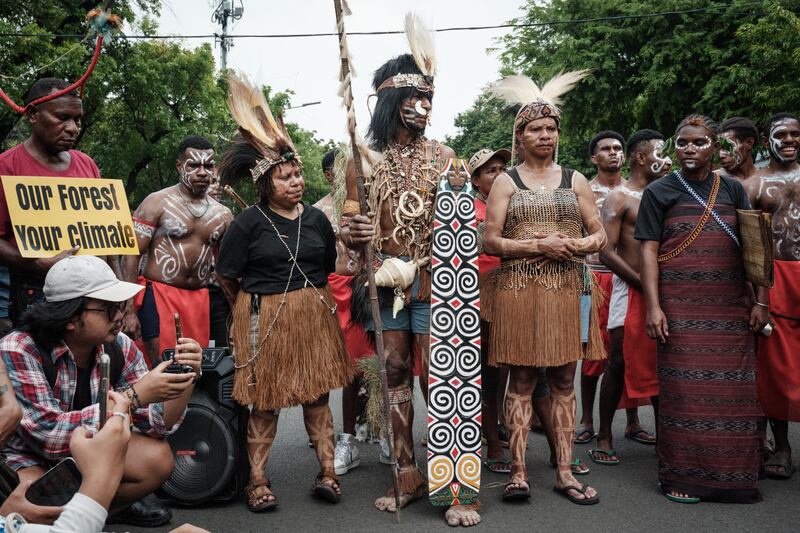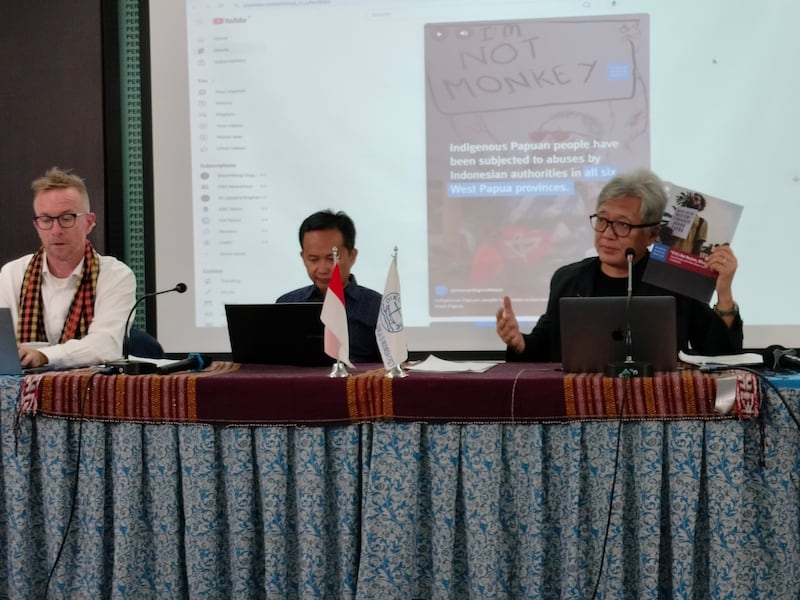An international human rights watchdog detailed what it calls entrenched racism and systemic discrimination against the indigenous ethnic Melanesian people in Indonesia's Papua region, in a new report released on Thursday.
Papua has seen a long-running conflict between Indonesian security forces and separatist rebels since it was formally integrated into the Southeast Asian nation in 1969 after a controversial referendum.
The report by Human Rights Watch (HRW), titled " If It's Not Racism, What Is It?," said the Indonesian government had responded to Papuans' calls for independence with arbitrary arrests, torture, forced displacement and extrajudicial killings.
International human rights organizations have repeatedly called on Indonesia to allow independent investigations into the human rights situation in Papua, but the government has restricted access to the region.
Andreas Harsono, a senior researcher at HRW, said Indonesian authorities needed to tackle systemic racism against indigenous Papuans.
“The Indonesian government needs to finally recognize that international human rights law applies in West Papua and meet its obligations to the people there,” he said in a statement accompanying the report.
West Papua is another name for the Indonesian half of New Guinea island.

The HRW report highlights the Papuan Lives Matter movement, a social media campaign inspired by the Black Lives Matter movement in the United States.
The campaign gained momentum after a racist attack on a Papuan student dormitory in Surabaya in 2019 that sparked protests across Indonesia.
The Indonesian authorities responded by arresting more than 1,000 demonstrators, with more than 240 convicted on charges such as treason, according to a group called Papuans Behind Bars that monitors political prisoners in the region.
“The Indonesian government’s suppression of widespread protests after a 2019 attack on Papuan university students highlighted longstanding racial discrimination against Indigenous Papuans,” HRW’s report said.
Ali Mochtar Ngabalin, a spokesman for the president's office, rejected claims of racism and discrimination and questioned the standards used to make such allegations.
“In governance, there is something called soft diplomacy,” he told BenarNews.
“It is precisely because we deeply consider human rights that the president [Joko “Jokowi” Widodo] insists on using soft diplomacy, with a strong focus on human rights.”
The outgoing leader had visited Papua 19 times, Ali Mochtar noted.
“People should not overlook the significance of these visits,” he added.
‘They are called dirty’
Increased militarization in Papua since the 2019 protests shows the Indonesian government’s efforts to stifle dissent in the region, according to Benny Giay, a senior figure in the group Papuan Church Council.
“People who are arrested, people who are killed – they are always labeled as separatists or terrorists,” Giay told BenarNews.
“The government has used security forces to silence critical voices. They view every Papuan as a threat, and that’s how they justify the arrests and killings.”
Veronica Koman, a human rights activist, said Papuan students studying outside the region often struggle to find housing because of negative stereotypes.
“They are called dirty, disruptive, or stupid,” Veronica told BenarNews. “It’s an example of the everyday racism Papuans face.”

At a policy level, Koman added, Papuans were sidelined during key political processes, including the controversial autonomy laws for Papua introduced in recent years.
“Special autonomy and regional division were driven by Jakarta, not by Papuans,” she said. “Papuan voices were never considered equal—that’s racism at the policy level.”
In the social sphere, the report found that Papuan children, particularly in remote areas, face severe barriers to health care and education.
Agus Sumule, a lecturer at the University of Papua, said that the Central Highlands, where most of the population is indigenous, did not have a single teacher training college.
“If it’s not racism, what should I call it?” he said in the report.
RELATED STORIES
[ Indigenous Papuans rally as Pope Francis urges harmony in IndonesiaOpens in new window ]
[ Report: Dozens dead, hundreds injured from Indonesian police abuses in past yearOpens in new window ]
[ Indonesia accused of subverting Pacific push for UN rights mission to PapuaOpens in new window ]
[ 4 killed, hundreds flee as Indonesian military battles Papuan fightersOpens in new window ]
When Jokowi was elected in 2014, there were high hopes for significant human rights reforms in Papua.
Early in his presidency, Jokowi took a symbolic step by releasing five Papuan political prisoners. At the time, he also pledged to open Papua to foreign media, diplomats, and human rights monitors.
However, nearly a decade on, as Jokowi ends his second and final term, little has changed for Papuans, HRW said.
And the looming presidency of Prabowo Subianto, who is scheduled to be sworn in on Oct. 20, doesn’t inspire hope among Papuans.
Allegations of grave human rights abuses have dogged Prabowo, a former general, since his time in the military, and Papuans are concerned about the policies he will adopt towards their region.
Rebels to release detained pilot
Meanwhile, the West Papua National Liberation Army (TPNPB) on Tuesday announced it would unconditionally release New Zealand pilot Phillip Mark Mehrtens, who has been held hostage since February last year.
Sebby Sambom, a spokesman for the group, said in a video statement posted on YouTube that the decision was made on humanitarian grounds and that no conditions would be attached to Mehrtens’ release.
He did not say when Mehrtens would be freed.
Sambom reiterated, however, that the group’s demand for West Papuan independence remains unchanged.
“Our struggle for an independent West Papua is non-negotiable,” he said.
